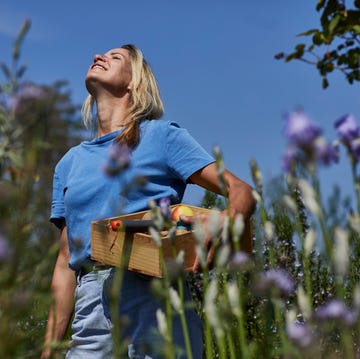“As I carried the Women's Football Association cup onto the pitch at Wembley, I was so emotional. I was overwhelmed with memories and felt as if all the young players from my 30 odd years of involvement in football were alongside me. It was an absolutely magnificent occasion,” recalls football trailblazer, Elsie Cook, who became the founding manager of the Scottish women’s team. “I don’t think girls now realise what we went through in the 60s and 70s.”
Despite women’s football matches recorded as early as 1881, and even bringing in crowds of tens of thousands up to the 1920s, the Football Association (FA) effectively banned women playing in 1921, saying, "The game of football is quite unsuitable for females and ought not to be encouraged." The ruling meant female teams were not able to play on official pitches and had no access to referees, funding, equipment or anything else FA-affiliated.
Over the next five decades, pioneers like Elsie Cook fought against (and found ways to circumvent) the ban, until it was finally lifted in 1971 in England, and 1974 in Scotland.
“I was on a mission. I was a football suffragette and I had to prove that women could play football,” Elsie tells me over the phone, her strong Scottish accent ringing with conviction.
I ask Elsie to take me back to the root of that determination. She recalls being 11 years old and asking to join a group of boys kicking a ball around the village she grew up in, Stewarton, about half an hour’s drive from Glasgow.
“The answer was, ‘Shove it. Lassies can’t play football. Who do you think you are, Pelé?’ I was furious,” she says, adding that legendary footballer Pelé was indeed a hero of hers.
A few years later, Elsie was able to prove them wrong as her mother, a netball coach, was asked to put a girls’ football team together for a charity match. Elsie put up flyers around the town to recruit players and asked for donations of old football boots.
Elsie remembers a crowd of around 500 coming to watch and how all eyes were on one player, Susan Ferries, who scored every goal and won them the game, seven-nil.
“You could hear people muttering around the pitch, ‘Have you ever seen a goal like that? And it was a lassie!',” Elsie says. “Susan had all the attributes of a top male player and I thought, there must be other lassies in Scotland with that same talent. So, at age 15, I took over the team.”
Stewarton Thistle (now Kilmarnock F.C.) was born but, in 1962, the ban by the English FA and Scottish Football Association (SFA) was still in place, meaning Elsie had to be resourceful. She borrowed shirts from the local men’s team, used a pitch on Sundays when the rest of the village was in church and would ask passers-by to stand in as referees.
“I would see a youngster playing with boys in the street or kicking a ball against a wall and recruit them to the team. As word got about, I was receiving information about local lassies looking to play. Some girls had to take three buses, which was a lot of expense, to get to the game. It just shows how seriously they took it,” she tells me.
When it came to getting to matches further afield, they had to pull in favours; from Elsie’s uncle volunteering his van, to having the team “lying in layers on the back seat” of her tiny Peugeot. She even resorted to hiring a local milk truck.
“The players sat in the back on milk crates. During the long journey, they were all getting out of the van to throw up because of the smell of sour milk,” says Elsie, laughing at the memory.
Reflecting on the early days, Elsie recounts numerous happy anecdotes in spite of the challenges, and says that, whatever the circumstances, the team were always laughing.
“If we won, we won. If we lost, we lost. It was about growing the game and opening up football for everybody. Opposing teams were our rivals, but we befriended them and that's how we kept expanding the game,” she says.
The team’s determination and talent didn’t go unnoticed and local support, which had initially been disapproving, completely turned around.
“People were accepting of us locally and they would look forward to seeing the games. The church women raised funds to get us a set of [uniforms],” Elsie tells me. “People were helping us now, instead of laughing at us.”
In 1971, the FA lifted the ban on women’s football in England, but it remained in place in Scotland under the SFA. The following year, a separate Scottish Women’s Football Association (SWFA) was founded, and Elsie became its very first secretary.
It was in this role that Elsie helped spearhead the first international game between Scotland and England. In 1972, the ban in Scotland was still in place, so she had to source a private pitch to host the match, as well as a local referee to oversee the game.
“Although we lost 3-2 to England, it was a great honour. The score didn't matter. What was more important was just playing with women, it was absolutely amazing. We felt that we were now recognised,” Elsie says proudly.
Despite the landmark moment, there were still lots of “misogynistic blooming comments” as Elsie puts it to me, with some of the worst being from the press.
She reads snippets of articles out over the phone, including quotes such as, “females running around a football pitch, bouncing boobs all over the place”, “if they were trying to make the world see that women were as good as men, they've failed” and, “women are not built for football.”
The negative comments did little to dampen the players' resolve and, two years after that historic match, the SFA finally lifted the ban on women players in Scotland. This paved the way for the first official Scottish women’s football team.
By this time, Elsie was married with two daughters and reluctantly travelled to Edinburgh to resign from her position as secretary of the SWFA during an official meeting. Serendipitously, the following item on the agenda was to choose the manager of the new national women’s team.
“The players up the back of the hall started shouting, ‘We want Elsie!’” she recalls. “I had ideas of expanding the game for women and here I was, being offered the Scotland manager's job. This was an opportunity of a lifetime, to take these clever, talented lasses and mould them into a Scotland team.”
Elsie remembers sitting on the train home wondering how she was going to explain the news to her husband.
“I said, ‘I resigned. But they've asked me to be the Scotland manager - and I've accepted!’” she recounts, a burst of laughter escaping.
The Scotland women’s team went from strength to strength, even being invited to play matches abroad in places like Italy. Elsie says she was blown away by the support offered to the women’s teams over there, and saw how much more could be achieved back home.
“I could see the dreams I had for women's football were actually being realised,” she says.
To get her team to the highest level, Elsie knew that the focus needed to start at grassroots - getting girls into football and nurturing talent from a young age. So, Elsie established youth programs for under 9 to 16 year olds, which she continued to run until 1993. She describes her work with young players as her greatest passion.
“It was just so rewarding, I think they were my happiest days,” she tells me.
Another of Elsie’s career highlights was getting to meet her hero, Pelé, on a number of occasions, and even being invited to events by him. I point out that Elsie has come a long a way since the boys in her village used Pelé’s name to make fun of her football ambitions. Indeed, the stance to towards women in the sport more broadly has hugely evolved in recent years.
“The attitudes to women playing football have almost disappeared since the success of England in the Euros. Football for women is at last acceptable and is drawing in huge crowds,” says Elsie, referring to England winning the UEFA Women's Euro in 2022. “I dreamt of a women's world cup, European cups, professional leagues with women referees and commentators. I held on to that for the rest of my life.”
And, as the world watches the 2023 Women’s World Cup over this summer, it looks like Elsie’s dreams may (finally) be coming true.
Elsie Cook partnered with Nationwide Building Society as part of their ongoing Mutual Respect programme in partnership with The FA.




















